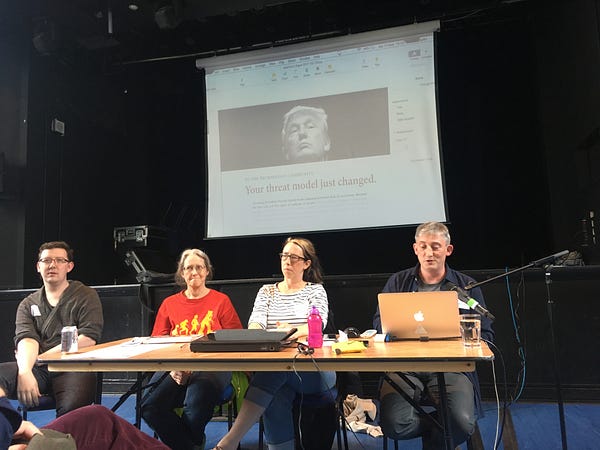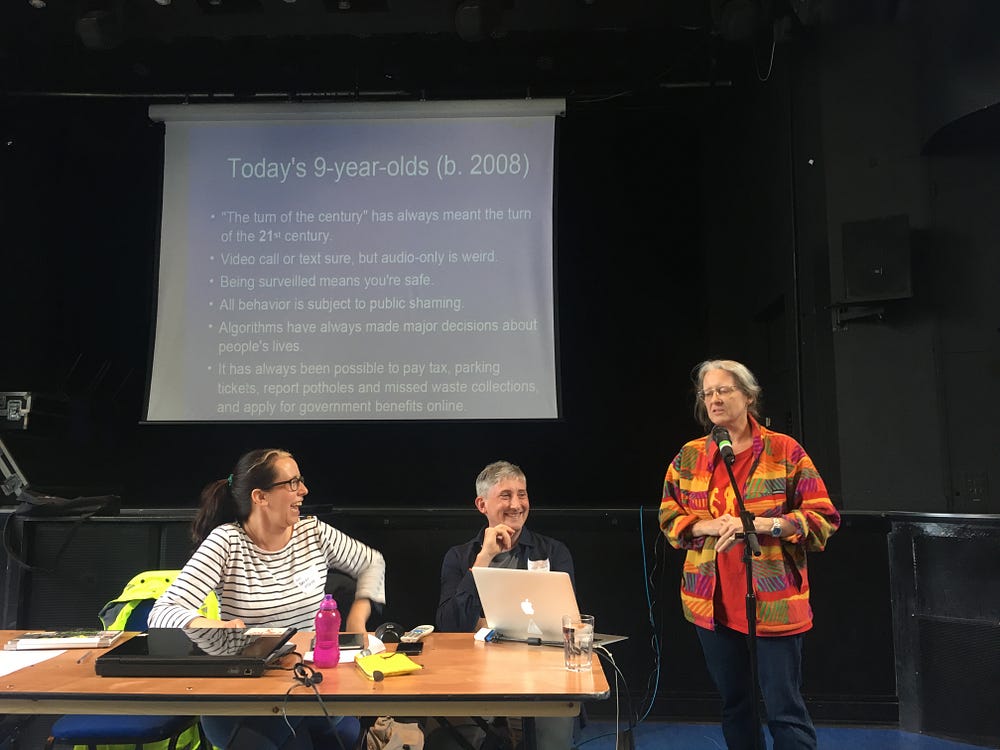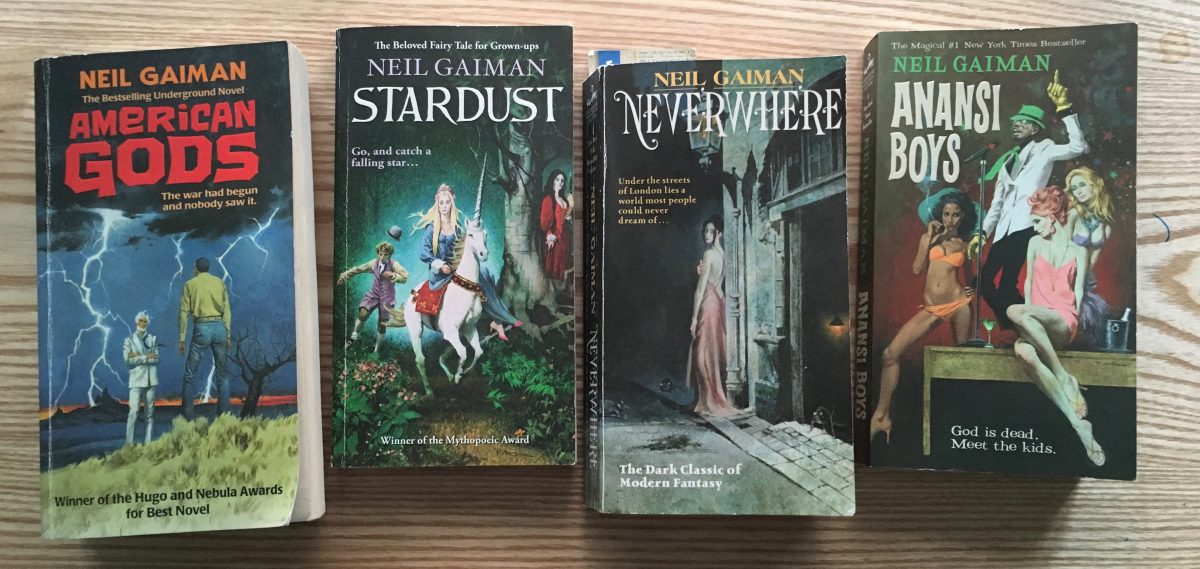Not done an end of year post for a while, in fact I’ve not managed to post to my personal blog at all in 2018 which was rather remiss of me! Continue reading “Goodbye 2018, hello 2019”
OpenTech 2017
I made my first trip to OpenTech yesterday hosted at University College London. I didn’t really know what to expect, I’d spotted the conference on my Twitter feed and I understood it to be a day full of discussions on open data, technology and how they contribute to society.
I was impressed. It was a busy and passionate conference, full of people who work with tech trying to make a difference to society, making it more open and fair, against a challenging and often unhelpful world.
My day started with Hadley Beeman, a member of the W3C Technical Architecture Group. Hadley’s talk was on “Standards for Private Browsing,” she explained how user expectations of how private browsing works differs from how browsers actually do it. Some US research stated the most popular reason to use private browsing mode is to hide embarrassing searches, however only Safari hides recent searches. Not helpful for users.
The concept of private browsing needs standardisation, not only to help user’s expectations about how their data is stored but also to help people build technology and be confident about how private mode will work. With the rise of Web Payments this is only going to become a larger issue. Hadley said more user research is needed to help in this area.
Rachel Coldicutt followed on with a passionate, excellent talk about Doteveryone, the think tank that is “fighting for a fairer internet.” Rachel gave a good overview of how Doteveryone is trying to improve digital understanding for everyone by focussing on education, standards for responsible technology, and stimulating new value models.
She talked about the rise of power of the big four “GAFA” (Google, Apple, Facebook, Amazon) and how these companies wield much unaccountable power on the internet today. With a government, if you disagree how things are run, you can revolt, not so with Facebook. She revealed 7 developers are responsible for the Facebook timeline algorithm (just 7!), a technology that is becoming bigger news with how it’s seen to have influence on recent political decisions. She also raised an interesting idea around a “fair trade” mark on the internet and how that could work.
The next session was by Anna Powell-Smith who talked about an offshore property ownership project she worked on for Private Eye. She worked on pulling data sources together to build a map of properties in England and Wales owned by offshore companies. Offshore ownership is problematic because it’s used for tax avoidance by those with often dubious means of making money. Anna told an interesting story of how she matched FOI requested data up with the INSPIRE dataset (important, but restricted, geo-spatial data on properties), a process that seemed pretty convoluted and difficult but was successful. The Private Eye report was discussed in parliament and it looks like the government are starting to make some positive movement in making this data more available.
However.. Ordnance Survey are legally obliged to make money out of their data so they are not willing to make this completely open. The critical component Anna used in her research, matching the INSPIRE ID to title IDs is no longer available without spending £3 per property, which makes it cost-prohibitive.
The government has put this requirement on Ordnance Survey to sell their data rather than make it open. Anna made a call for any economists to help make the case for why this data should be free and how it would have a positive economic impact in the UK. If anyone can help contact Anna at https://anna.ps/
The next speaker was ill, so John Sheridan helped out with an impromptu talk on his work at the National Archives. This was fascinating, touching on the different challenges between physical and digital archives, how context is important in archived data, how copying is a core part of digital archiving (“there is no long term storage solution for digital”), how this also requires validating the data you have stored is still the same (they use hashing methods to help with this), and how you need to understand the data you store so you can also provide a means to view it. The general message was data encoded in open formats is easier to archive, and to make available in the future.
John also touched on the UK Web Archive project, run by the British Library who have a digital archive of around 3 petabytes, most of which is not published online mostly for copyright reasons. While the US-based Internet Archive has a policy to publish first and takedown content on request, as a UK public institution the British Library and National Archives have a lower appetite for risk for potential legal action — and therefore only publish when they have permission to do so.
I chatted to John in the bar after the event and he explained that the National Archives takes responsibility for archiving all government digital content, taking snapshots every 3 months or so. The Web Archive project deals with UK websites. I asked him where a past project we worked on would be archived, the Armada Tapestries site for the House of Lords. Apparently this is taken care of by Parliament itself in the Parliamentary Archive. Lots of people archiving things!
After lunch I joined the Post Fact / Future News panel which turned out to be a real highlight of the day.

The speakers were James Ball, Wendy Grossman and Gavin Starks and the panel was hosted by Becky Hogge.
James started proceedings and talked eloquently and in detail explaining the difference between Fake news (an outright lie, not so common in the UK) and Post-truth bullshit (manipulation of an almost-truth) — basically where we find ourselves today. James talked at speed and with confidence and painted a fascinating, dark picture of how news is being manipulated for political ends at present and how a good narrative can often trump a complicated truth that is difficult to explain to the general public.
James made a great point on how you “can’t use technology to solve cultural issues” and that “fake news is not an internet problem.” He highlighted the problem is in society already and in figures such as Boris Johnson who have a long history of manipulating the truth for a political agenda. He’s written a book on this topic, so go buy it: Post-Truth How Bullshit Conquered the World!
He also noted we need to “think about the business of the internet,” the idea of business / value models cropped up a few times during the day, a lot of the issues we associate with the internet are exacerbated by how the web makes money — alternative models need to be found to help improve the current state of affairs.

Wendy then moved onto future news. She talked about predictions she made in 1997 and how many of these have some truth today. She went on to explore what younger generations will think about technology and society and what are future headlines likely to be. Wendy’s talk was fabulous fun.
Gavin began his slot by reading out a written statement by Bill Thompson who was due to speak but was otherwise waylaid at the Venice Biennale! Gavin read out a short piece by Bill on the rotten state of the net at present. It made for a sobering interlude to the discussion.
Gavin then moved on to talk about the work he’s been involved in to make the internet more open. The Open Banking Standard, an anti-slavery corporate statement registry, and tracking the origin of products through the supply chain.
He talked about how we now need to up our game more, how the community thought the case for open data was won but this is not currently the case.
Gavin is currently interesting in creating impact@web-scale, trying to tackle solvable problems in the UK between policy and technology, bringing public and private sector together. He’s looking for people to help, you can sign up at http://www.dgen.net/ or find out more on his blog.
I’ve probably written too much already, but the rest of the afternoon was also enjoyable, peppered with public interest technology, Ada Lovelace Day(celebrating women in STEM), using climate change data to make a symphony, electrocution for fun and profit (and education!), using neural networks to help map happy places, what the Open Data Institute is up to, and a few beers in the union bar.
By the end of the day, my head was full of ideas, problems and a better understanding of what people are doing in the area of open tech. I learnt a bunch of useful things that I can takeaway for my day-to-day work, and will get me thinking about ways I can help make a difference and contribute to a better, more open and responsible technology.
Finally, a shout out to Kevin Marks who as well as live tweeting most of OpenTech also wrote a whole bunch of interesting notes.
What I’m reading in 2017
It’s fair to say I read a lot. I love books and always have a few stacked up next to my bed for a quick (or long) read before I fall off to sleep. I also love books for work, since although there is a huge amount of resources on the web, published books distill expert knowledge, are peer-reviewed and are a great way to get a good overview of a particular subject.
Viewing images on the command line and the “No identify available” error
I’ve been testing a website that generates images on the fly and in the past had used the less command to view the file contents, this helped see when PHP errors had unfortunately made their way into an image file.
However, sometimes when viewing a file I got the following error returned:
No identify available Install ImageMagick or GraphicsMagick to browse images
I’m pretty sure I worked this one out a few years ago, but had obviously forgotten. Turns out you can’t view binary files via a command like less!
The right way to view an image file is a command such as xxd. To view the top of a file (which usually points in the direction of the file format) use a command such as:
xxd /path/to/file.jpg | head
This command works just as well for text files, so will still pick up if PHP errors are inside the image file instead of the correct binary data.
Saving this one for later so I don’t forget again!
Sherlock, 1895
Well that was fun. A new episode of Sherlock is always something to savour, the feature length intellectually savvy TV series from the BBC that had a special pre-season four episode tonight.
Warning: here be spoilers..
Continue reading “Sherlock, 1895”
New Year 2016
As I welcome the new year and type these words my kids are getting dressed upstairs, ready for a refreshing midday walk along Grantchester Meadows to lunch at the tearooms (with promises of scones). It’s been a busy year for me, but a very relaxing Christmas break, spent at home with the family just having fun. Which is my ideal Christmas, quite frankly.
Continue reading “New Year 2016”
7/7
After viewing the coverage of the 7/7 anniversary on the BBC I can’t believe it’s been 10 years since that awful day in London. So much has happened in the decade since, though in some ways the same fears and worries still exist.
Continue reading “7/7”
